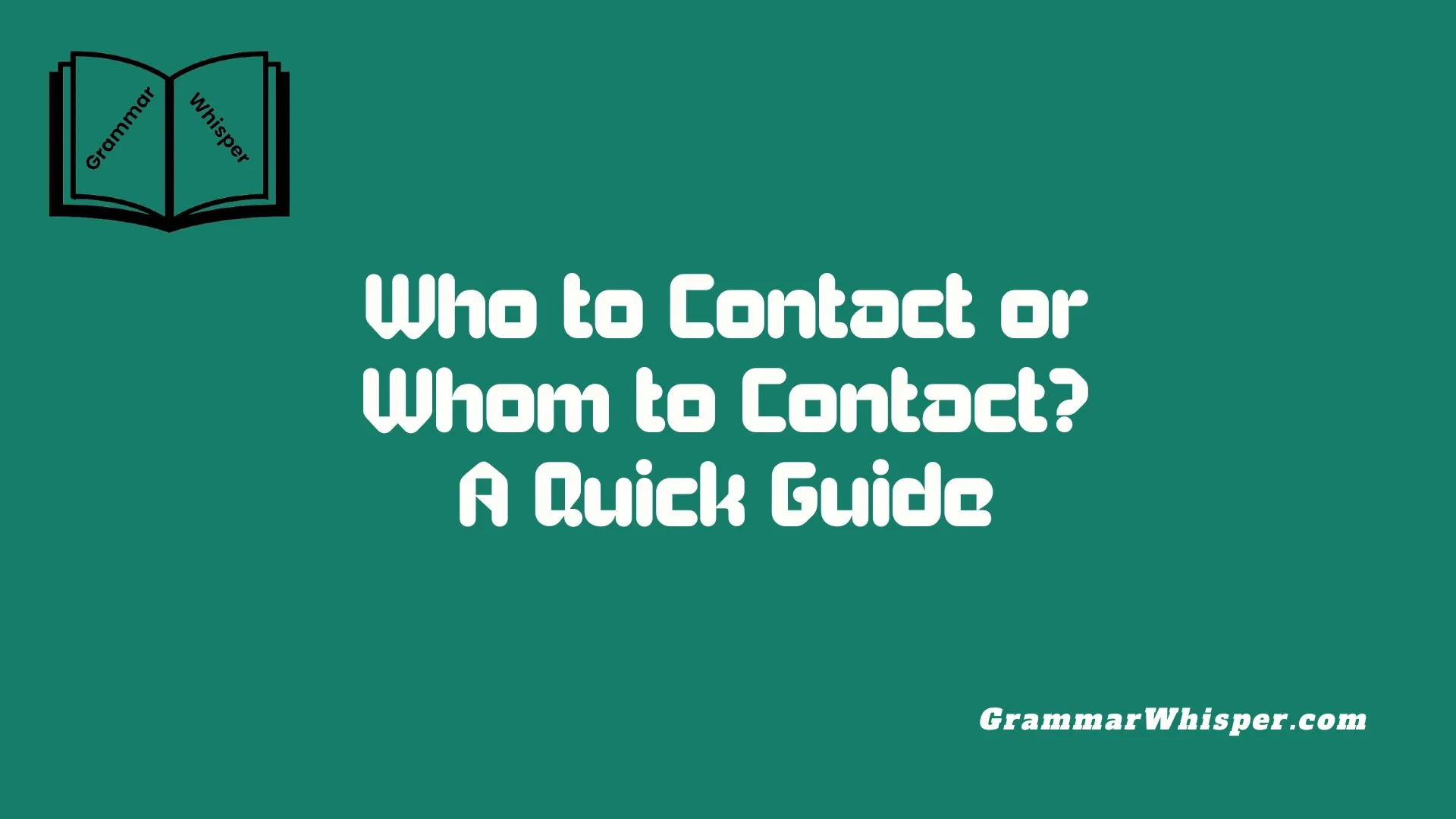Over my years of working with learners, I’ve come across countless grammar puzzles – but few are as persistent as the conundrum of choosing between who and whom. Even native English speakers often find themselves second-guessing their choice, because it hinges on understanding whether the word functions as a subject or an object. I’ve watched many students become overwhelmed, until we break things down using real-life examples and simple explanations. The moment that fog lifts, it’s always a pleasure to witness. In my experience, once they grasp a few sentence patterns, they gain confidence in making the right decisions in their writing.
What fascinates me today is how the topic continues to evolve. The modern usage of language is shifting – some cling to traditional rules, while others embrace a more conversational tone. A good guide does more than just teach rigid forms; it offers insights into how people truly speak today. My aim has always been to demystify sentence structure while promoting clear, natural communication. As language adapts to changing trends, we’re reminded that mastering this aspect of grammar requires understanding both formal and informal expressions.
Understanding the Confusion: “Who” vs “Whom”
At the heart of the “who” vs “whom” dilemma lies the grammatical roles these pronouns play:
- Who: Functions as the subject of a sentence or clause.
- Who serves as the object of a verb or preposition.
Example:
- Who wrote the letter? (“Who” is the subject acting?)
- To whom was the letter addressed? (“Whom” is the object receiving the action.)
A helpful trick is the he/him test:
- If you can replace the word with “he” or “she,” use who.
- If “him” or “her” fits, use whom.
Example:
- Who/Whom did you see?
- You saw him → Correct: Whom did you see?
The Traditional Grammar Rules
Traditional grammar dictates the use of “who” and “whom” based on their syntactic positions:
- Subject: Use “who.”
- Object: Use “whom.”
Examples:
- Who is coming to the party? (“Who” is the subject.)
- Whom did you invite to the party? (“Whom” is the object.)
Modern Usage Trends and Preferences
In contemporary English, especially in informal contexts, the distinction between “who” and “whom” is often blurred. Many native speakers default to “who” regardless of grammatical correctness.
Statistics:
- Studies have shown that “who” is used more frequently than “whom” in spoken English, even in cases where “whom” would be grammatically correct.
This shift reflects a broader trend towards simplification and informality in language use.
The Shift in Language: Analyzing Common Usage
The decline of “whom” can be attributed to several factors:
- Complexity: “Whom” is often perceived as formal or archaic.
- Informality: Modern communication favors a conversational tone.
- Education: Grammar instruction has evolved, with less emphasis on prescriptive rules.
Despite this decline, “whom” still exists in formal writing and specific contexts.
Why “Whom” Is Falling Out of Favor
The decreasing use of “whom” is evident in various forms of communication:
- Social Media: Platforms like Twitter and Facebook favor brevity and informality.
- Text Messaging: Quick exchanges often omit formal grammar.
- Casual Conversation: Spoken English tends to prioritize ease over correctness.
However, in academic writing, legal documents, and formal correspondence, “whom” remains relevant.
Professional Communication: Which Form to Use
In professional settings, the choice between “who” and “whom” depends on the desired tone and audience expectations.
Considerations:
- Formality: Use “whom” in formal reports, academic papers, and official documents.
- Clarity: Prioritize clear and concise language.
- Audience: Tailor your language to the expectations of your readers.
Example:
- Formal: To whom it may concern.
- Informal: Who should I contact?
The Role of Formality in Choosing Between “Who” and “Whom”
Formality plays a significant role in determining the appropriate pronoun:
- High Formality: Legal documents, academic writing, and official correspondence often require “whom.”
- Low Formality: Emails, casual conversations, and social media posts typically use “who.”
Table: Usage Based on Formality
Context
Preferred Usage
Academic Paper
Whom
Business Email
Who
Text Message
Who
Legal Document
Whom
Seeking Formal Guidance: When to Stick with “Whom”
Certain style guides and institutions provide specific guidelines:
- AP Stylebook: Recommends using “whom” when it is the object of a verb or preposition.
- Chicago Manual of Style: Advises adherence to traditional grammar rules.
- Merriam-Webster: Notes the declining use of “whom” but acknowledges its correctness in formal contexts.
Consulting these resources can help determine the appropriate usage in professional writing.
Matching Pronouns with Verbs: Understanding the Grammar
Understanding the relationship between pronouns and verbs is crucial:
- Subject Pronouns: “Who” pairs with verbs as the subject.
- Object Pronouns: “Whom” follows verbs or prepositions as the object.
Examples:
- Who is responsible for the project? (“Who” is the subject.)
- To whom should the report be sent? (“Whom” is the object of the preposition “to.”)
Is “Whom” Still Necessary? Examining Current Standards
While “whom” is less common in everyday speech, it remains necessary in certain contexts:
- Clarity: Using “whom” can prevent ambiguity.
- Formality: Maintains a professional tone in writing.
- Precision: Demonstrates attention to grammatical detail.
However, overuse or incorrect use of “whom” can appear pretentious or awkward.
Who or Whom in Digital Communication: Does It Matter?
In digital communication, the emphasis is often on speed and clarity rather than strict adherence to grammar rules.
Observations:
- Emails: Generally favor “who” for simplicity.
- Social Media: Informal tone makes “who” more common.
- Professional Platforms: LinkedIn posts and professional blogs may still use “whom” for formality.
Ultimately, the choice depends on the platform, audience, and purpose of the communication.
How Technology Impacts Grammar Choices
Technology influences language use in several ways:
- Autocorrect: May not flag incorrect usage of “who” and “whom.”
- Voice-to-Text: Transcriptions often default to “who.”
- Grammar Checkers: Tools like Grammarly provide suggestions but may not always enforce traditional rules.
Writers should be aware of these influences and make conscious choices based on context.
Final Recommendations: Opting for Clarity in Your Communications
When deciding between “who” and “whom,” consider the following:
- Audience: Tailor your language to your readers’ expectations.
- Purpose: Match the formality of your writing to its function.
- Clarity: Prioritize clear and understandable language.
Quick Reference Table
| Situation | Recommendation |
| Formal Writing | Use “whom” |
| Informal Conversation | Use “who” |
| Uncertain Context | Rephrase |
| After Prepositions | Use “whom” |
Conclusion
The distinction between “who” and “whom” is rooted in traditional grammar but has evolved. While “whom” is declining in everyday use, it retains its place in formal writing and specific contexts. By understanding the rules and considering the audience and purpose of your communication, you can make informed choices that enhance clarity and professionalism.
References:
- Grammarly: When to Use “Who” vs “Whom”
- Merriam-Webster: How to Use Who vs. Whom
- Scribbr: Who vs. Whom
FAQs
What’s the easiest way to know whether to use “who” or “whom”?
A simple test is to try replacing “who” or “whom” with “he” or “him”:
- If “he” fits, use “who” (subject).
- If “him” fits, use “whom” (object). Example: You gave the file to ___? → You gave the file to him → Use “whom”.
Is it wrong to always use “who” instead of “whom”?
It’s not strictly wrong in casual speech or informal writing. Most native speakers default to “who” in conversation. However, in formal, academic, or professional settings, using “whom” correctly shows attention to detail and grammar rules.
When should I use “whom”?
Use “whom”:
- After prepositions (e.g., To whom it may concern)
- In formal writing (e.g., academic papers, legal documents)
- When it’s the object of a verb or clause, for Example: The candidate whom we interviewed was qualified.
Is “Whom should I contact?” correct?
Yes, “Whom should I contact?” is grammatically correct because “whom” is the object of the verb “contact.” You’re contacting him/her → use “whom.”
Can I just avoid the issue and rephrase my sentence?
Absolutely. When in doubt, rephrasing can help you avoid awkwardness while maintaining clarity. Instead of saying “Whom should I contact?”, say:
- “Who is the right person to contact?”
- “Can you tell me the contact person?” This keeps your language natural and correct without overcomplicating it.











